- Home
- Heather Graham
The Dead Room Page 3
The Dead Room Read online
Page 3
“What?”
Brad shook his head quickly. “I’m sorry. I shouldn’t even have mentioned that.”
“Who is this work for?” she demanded.
“The Historical Society, of course. Greta will be the official liaison between the society, the contractors and the workers. And once again, it’s Tyson, Smith and Tryon who bought and are developing the property. They’ve been legally blocked from building until the significance of the site is established and any necessary excavation is done. Laymon says they’re taking it well, though, basking in their national publicity as good guys. But the lost time must be costing them a bundle. Anyway, the site is really close to Hastings House. It’s in the next block, actually.”
“And that’s why they’re offering the rooms at Hastings House?”
He shrugged. “I don’t know why I even mentioned that, honestly. Hell, I have an apartment in the city, and you have your place in Brooklyn.” He took a deep breath. “Of course, you lived there with Matt, so maybe you don’t want to go back there. But I’m glad you’re holding on to it. Real estate in your neighborhood is rising sky-high. Oh, God, I’m sorry. That didn’t come out right. I’m stumbling all over here.”
“It’s all right, Brad.”
“Yeah. Right.” He tried to smile.
“I didn’t even get to go to his funeral. I was in the hospital,” she murmured, staring at the flames.
Suddenly a massive ache seemed to tear through her heart.
Ghosts came to her, sought her out sometimes, asked for her help.
But not Matt.
The ghost she wanted to see, desperately longed to tell—one last time—how much she had loved him, how he had been her life, how he had filled the world with wonder with his simple presence…that ghost she never saw.
“I want to stay at Hastings House,” she said.
He lowered his head. He was smiling, she realized. He was convinced that he had handled things just right, and that by talking about lodging, he had tricked her into deciding to go back.
Maybe he deserved his self-congratulations.
Or maybe it was just time for her to go back.
“You really want to stay there? You’re serious?”
“Dead serious.”
She stood, patting him on the shoulder as she started out. She paused in the hallway, looking back at him. “No pun intended,” she said lightly, and offered him a dry grin. “You’re right. I’m ready to go back. Excited to go back. Good night.”
She left him, still down on his knees by the chair.
Excited? Dear God, she was a liar.
And yet…
It was true. She never would have thought of it herself. Never would have woken up one morning thinking, Wow, I’d really love to head back to Hastings House.
But now that she was going…
The past beckoned to her. She needed to come to terms with it.
She had to go back.
2
It was late. A strange time, Joe Connolly thought, to be having this meeting. The woman sitting nervously across from him was stunning, but she reminded him of a high-strung, inbred greyhound. She was excessively thin, and her long fingers were elegantly manicured and glittering with diamonds and other fine jewels. She had called that morning and set up this meeting. They were at the venue of her choice—a small Irish tavern off Wall Street. He would have expected her to suggest a private corner at an exclusive club, but perhaps she didn’t want to be seen with a private investigator. For whatever reason, she had chosen O’Malley’s, which was warm, small and inviting, a pub she had probably visited many a time in her youth.
She had originally come from humble stock, he knew. On her mother’s side, she was second-generation Irish; her father, an O’Brien, came from a line of hard-working laborers who had arrived in the United States during the 1840s. Blood, sweat and muscle had taken him far in the trades, and thus their modest family fortune had begun and then risen to riches. Then Eileen O’Brien had married well, and she was now Mrs. Thomas Brideswell, widow of the late senator and construction magnate.
She thrust an eight-by-ten picture of a young woman across the table at him. He stared down at the likeness. Genevieve O’Brien looked back at him. Her eyes were huge and blue, and she was as slender as her aunt Eileen, with beautifully defined features. Her hair was dark, with an auburn sheen. The photographer had captured laughter, eagerness and the optimism of youth.
“How old is this picture?” Joe asked.
“It was taken about two and half years ago,” Eileen said, and hesitated. With a weary sadness and a hunch of her shoulders, she looked down. “Just before her falling out with my brother and me.”
Joe shook his head. “I’m sorry, I don’t mean to press the issue, but I need to understand. If she left home voluntarily, and there was already an estrangement between you, what makes you so sure that something’s happened to her?”
Eileen sighed deeply. “Donald died soon after she walked out of his house. She came back for his funeral. She wanted to keep her distance from me and what she called my ridiculous family devotion to a ridiculously dysfunctional family. I think she was upset that my brother died without the two of them ever having made their peace, but…” She lifted one of her bejeweled hands. “I suppose it was nasty growing up in my brother’s household. There was a lot to be said for everything my father and grandfather accomplished, but it came at a price. Impossible expectations for their children. So much fault-finding when something was wrong.” She shook her head, and Joe felt moved by her obvious distress. There was such a deep and underlying sadness in the woman, despite her reserve and elegance. She looked him in the face then. “Ever since my brother died, she’s called me every two weeks. At least once, every two weeks. I haven’t heard from her in over a month.”
He leaned back, watching her. He had learned a lot in his years with the police force, and a lot more in the years since he had gone out on his own. Watching someone’s face as they spoke was often as important as listening to the words that were said.
“Was there something said between you the last time you spoke that might have caused a greater rift?” he asked.
There was a very slight hesitation.
“No,” she said.
She was lying.
“I need to know everything,” he said firmly.
Again an elegant hand fluttered. “Well, there had been this awful article in one of those tabloids about the family,” she said.
“And?” he prompted.
“She was convinced that her father wasn’t her father.”
“She bears a remarkable resemblance to you. I’m assuming you and your brother must have looked quite a bit alike,” he said.
“Exactly,” Eileen said.
He waited. “What was the paper? When was the article printed?”
“You don’t want to read that dreadful piece of garbage,” she assured him.
“I need to read it. Mrs. Brideswell, I’m working in the dark here. Your niece is twenty-six. She’s an adult. Adults who choose to disappear are allowed to do so. I have almost nothing to go on. You’ve given me first names and street names for a few acquaintances, and I have her work contacts—though she resigned from her job a month ago. That in itself could indicate that she planned to leave the city. I have addresses for a few of the places where you believe she hung out. You can’t hold back on me. And when I find her—if I find her—I can’t guarantee I can convince her to call you.”
“No! You don’t understand. I believe with my whole heart that if she could call me, she would.”
Joe answered carefully. “Do you believe that your niece is dead, Mrs. Brideswell?”
Pain flashed across her features. “I don’t know,” she whispered. “I just…I know that she loved…loves me. No matter what came between us…Genevieve would call me. And if she’s out there somewhere…crying for help, she’s crying to me. Oh, my God, Mr. Connolly, I’ll admit there were awful times in the family, times when she
was sent away…we were so embarrassed by her activities! My brother was…very strict. With reason, I suppose. My father taught us that we had to behave with propriety, or at least the appearance of it. But still…she loves me. And I know she needs me. I’ve had to admit to myself that she may be dead, but don’t you understand? I have to know. And if she has become a victim of…of some misfortune, I have to see justice done for her before I die.”
Joe wondered why she spoke so passionately about her own death; she couldn’t be more than forty-something, and she could easily be mistaken for thirty-five.
“A victim of misfortune,” Joe repeated, and asked flatly, “Do you suspect that she was murdered?”
Eileen inhaled deeply, and when she spoke, her words were bitter. “I’ve spoken to the police, Mr. Connolly, which of course you would imagine I had done. And I don’t know if he warned you or not, but it was your old friend Sergeant Adair who suggested I call you, but not until after he gave me a speech about all the other disappearances that are perplexing him. I gather the police are trying to keep what’s been going on with those prostitutes under wraps, though of course it’s not working. People talk. And those disappearances have been going on for more than a year.”
“But your niece wasn’t a prostitute plying her trade downtown,” he reminded her.
She waved a hand in the air. “I know. And we all know that plenty of people not involved in…in the trade disappear, as well. But I got the impression that Sergeant Adair sees some relationship between those disappearances and the fact that I haven’t heard from Genevieve.”
Joe was confused. He knew that Robert Adair was tearing his hair out over the continued disappearances of prostitutes in the downtown area. There were no clues, no trails of blood. The girls just disappeared, but the police knew they hadn’t just moved on—unless they’d moved on without saying a word and leaving all their belongings behind. But what would the daughter of a millionaire have in common with a bunch of missing prostitutes?
“I think this remains a very sensitive area for the police. The women who’ve disappeared are adults. Adults have a right to move on in their lives.”
Eileen stared at him, her eyes scorning his words. “We both know the truth.”
She was right. It had begun over a year ago. A few months apart, two prostitutes had vanished, but since there had been no clues and no signs of foul play, little had been done when their friends reported them missing. Then a homeless transvestite known as the Mimic had disappeared. Then two more young women.
She leaned closer to him, her eyes still flashing. She might be rich, but she could be tough when she needed to. “The thing is, prostitutes murdered by their johns usually turn up somewhere. A homeless man who freezes to death is found on the pavement. But these girls disappeared off the streets without a trace—just like Genevieve. Do you think aliens are beaming these people up, Mr. Connolly? I don’t. I think there is a serial killer at large in New York who knows how to dispose of bodies so they’ll never be found. I thought it was disgraceful when I first heard about the disappearances and the apparent lack of concern on the part of our government on the local and even the state level. Now? I’m incensed. Don’t get me wrong. I’m not angry with the poor cop just trying to work his beat. I’m furious that someone doesn’t step in and say, ‘These people count!’ And now I haven’t heard a word from Gen in so long, and every day I’m more and more worried, and though it doesn’t seem that I have any power, I do have money.”
“All right, let’s look at this from the beginning. Your niece was a social worker, yes?”
“Yes, here in the city,” Eileen murmured. “Up until a little more than a month ago. She found it terribly frustrating….” She inhaled deeply. “And not just the job itself. In my family, we were supposed to make—or marry—money. Both my brother and I were terribly hard on Gen, and all she wanted to do was make life easier on those who didn’t have the same advantages we did. The frustration and red tape got to her, as well, but…none of that’s what matters now. This is the point, this is why I think there’s a connection. She’d been working to help prostitutes in the same area where prostitutes have been disappearing into thin air. Don’t you see? I’m sure she knew some of those missing girls!” Eileen herself seemed ready to explode at that moment.
“Do you know any particulars on why she quit her job?”
Eileen waved a slender, elegant hand in the air. “Irritation with the system. She wanted to get workfare programs going…she wanted to help some of the girls keep their children. She is really an extraordinary human being, Mr. Connolly. Oh, I am so frustrated. No one seems to believe that I know that something’s really wrong. The police can’t—or won’t—do anything.”
“I do understand your frustration,” Joe told her, “but you have to understand that the police are seriously frustrated themselves. The point is, these are disappearances. There’s nothing for them to go on. And the people who have disappeared—in this particular situation—have lived transient lifestyles, which makes it very hard, as well. They can question those closest to the victims—if that’s what they are. They can question people up and down the streets where the victims were last seen. They’ve harassed known pimps to the point that their behavior borders on the illegal. But absolutely no one so far has seen anything to indicate foul play. Meanwhile, the police still have murders, rapes and robberies to deal with, crimes with sadly obvious victims. There’s only so much they can do when they have no victims, no murder weapons, no blood trails, no evidence of any kind.”
“Blood trails?” Eileen said, her eyes snapping. “They have to find out what’s going on and stop it before we discover that we’re in a river of blood! And before my niece is discovered lying dead somewhere. But they’re not going to find out what’s going on because, as you say, they have to deal with the blood they do see on the streets. I’m not calling our police incompetent. They try. Sergeant Adair has, I believe, been ordered to find the explanation for these disappearances, no matter what. They’ve searched Gen’s apartment—if she disappeared by choice, she did so with only her purse and the clothes on her back, not even a good coat. They’ve been to her former office. They’ve tried to question people on the streets. Sadly, I know nothing about her real friends. Or if she was dating. The basics have been done. They’ve proved nothing. Except that she’s gone, which I already knew. So I’ve hired you.”
“I’ll do my best.”
“And you will find Genevieve,” she said passionately. “Because you will make finding her your priority every single morning from the moment you open your eyes. I’ll reward you highly.”
He pocketed the picture. “You know my fee. I don’t work to be rewarded highly. If I take a case on, it’s part of my every waking moment until I have an answer. But I’ll need your help at all times. Be ready to answer my calls,” he warned her. “I need to assimilate all that I’ve learned from you tonight, then get busy on my own and see what else I can discover. But I’ll need more help from you. I’ll need everything. Everything you know, anything that occurs to you. And don’t hold back on me. I’m in your employ. I’ll never repeat anything you tell me. Don’t let any family embarrassment hold you back from being entirely truthful with me, do you understand, Mrs. Brideswell? I can’t help you if you aren’t completely honest with me. No amount of money will change that.”
She nodded. Reaching down, she found her purse and produced a small notepad. “I’ve written down everything I know, what names and places I’ve heard…anything I can think of that might be some help.” She produced a pen, scribbling down another notation. “I’ve added the publication I was talking about,” she murmured. “That’s it.”
He accepted the notepad from her. “I’ll do everything I can,” he told her.
She picked up the teacup before her on the table, her eyes distant. She drank what must have been very cold tea by then.
“I’m very sorry about your cousin,” she said softly.
�
�Thank you.” The words took him by surprise, though he knew instantly what she meant.
“His death was a tremendous loss to the city, but for you, of course, it was very personal, and I extend my sincere condolences.” Her eyes began to water. “I was there that night, you know,” she murmured.
“I didn’t know,” he said.
“I learned later that Gen would have been interested in going. In retrospect, I’m glad I didn’t know in time to invite her. She’d met a lot of people involved through the years. She had a lot of close contact with the police—being a social worker and all. And she knew Greta through me, of course.”
Joe couldn’t help himself. He leaned forward. “What do you remember about that night?”
“The lights, the music, the beautiful clothing, the glamour…I was in the entryway when the explosion occurred. They rounded us up and got us out immediately. I remember standing on the street and just being incredulous. I remember the sound of the sirens, the ambulances, the paramedics…and the body bags,” she said. “I am so, so sorry.”
“Thank you. Eileen, do you remember anything strange at all?” he pressed.
She gave him a pained smile. “You lost someone you loved, so you want there to be a reason, a better explanation than a gas explosion. No, I’m sorry. It’s all a blur. I was chatting, there was a noise like thunder. Someone was screaming ‘fire,’ people were panicking…the cops came and we were all ushered out.”
Joe nodded. Just what had he been hoping for?
“Thank you,” he repeated.
Her eyes met his, and her words were desperate. “I have to find Genevieve, Mr. Connolly. Please help me.”
Although her posture still seemed so regal and aloof, he reached across the table and laid his hand on hers. “I will do everything I can,” he told her solemnly.
She almost smiled. And then she turned her palm up and gripped his hand in return. Her touch was strong, and as desperate as the sound of her voice.
They talked for a few minutes longer about Genevieve, and as the girl in the picture began to come to life for him, Joe began to make mental notes as to exactly where he would begin his investigation. First he would go over the basic police work. Then he would move on to where the police, by virtue of their sworn duty, could not go.

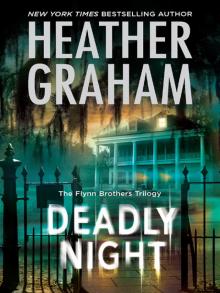 Deadly Night
Deadly Night The Uninvited
The Uninvited Dust to Dust
Dust to Dust Heart of Evil
Heart of Evil A Perfect Obsession
A Perfect Obsession The Keepers
The Keepers Pale as Death
Pale as Death Phantom Evil
Phantom Evil Hallow Be the Haunt
Hallow Be the Haunt Night of the Wolves
Night of the Wolves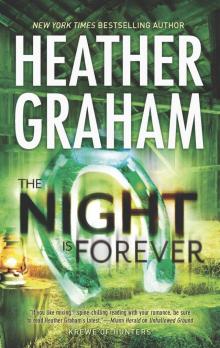 The Night Is Forever
The Night Is Forever Golden Surrender
Golden Surrender Kiss of Darkness
Kiss of Darkness Beneath a Blood Red Moon
Beneath a Blood Red Moon A Dangerous Game
A Dangerous Game Ghost Shadow
Ghost Shadow Long, Lean, and Lethal
Long, Lean, and Lethal Fade to Black
Fade to Black The Rising
The Rising And One Wore Gray
And One Wore Gray Rebel
Rebel The Unseen
The Unseen The Night Is Watching
The Night Is Watching The Evil Inside
The Evil Inside The Unspoken
The Unspoken The Night Is Alive
The Night Is Alive The Unholy
The Unholy Nightwalker
Nightwalker Deadly Harvest
Deadly Harvest An Angel for Christmas
An Angel for Christmas A Pirate's Pleasure
A Pirate's Pleasure American Drifter
American Drifter Realm of Shadows
Realm of Shadows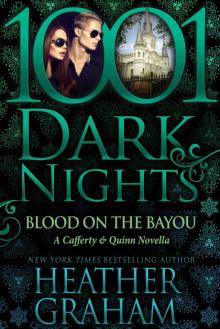 Blood on the Bayou
Blood on the Bayou Sacred Evil
Sacred Evil Dying to Have Her
Dying to Have Her The Cursed
The Cursed Captive
Captive Hurricane Bay
Hurricane Bay Drop Dead Gorgeous
Drop Dead Gorgeous Ghost Memories
Ghost Memories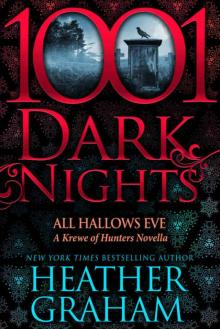 All Hallows Eve
All Hallows Eve Dying Breath
Dying Breath Deadly Fate
Deadly Fate The Dead Room
The Dead Room Lord of the Wolves
Lord of the Wolves Ghost Night
Ghost Night Ghost Walk
Ghost Walk The Forgotten
The Forgotten Unhallowed Ground
Unhallowed Ground One Wore Blue
One Wore Blue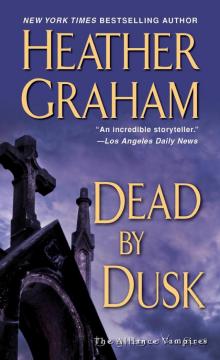 Dead By Dusk
Dead By Dusk Night of the Blackbird
Night of the Blackbird The Dead Play On
The Dead Play On Bride of the Night
Bride of the Night Wicked Deeds
Wicked Deeds The Forbidden
The Forbidden Triumph
Triumph Out of the Darkness
Out of the Darkness Love Not a Rebel
Love Not a Rebel The Last Noel
The Last Noel Tall, Dark, and Deadly
Tall, Dark, and Deadly The Death Dealer
The Death Dealer Dead on the Dance Floor
Dead on the Dance Floor Law and Disorder
Law and Disorder Dark Rites
Dark Rites New Year's Eve
New Year's Eve Hostage At Crystal Manor
Hostage At Crystal Manor And One Rode West
And One Rode West Home in Time for Christmas
Home in Time for Christmas Killing Kelly
Killing Kelly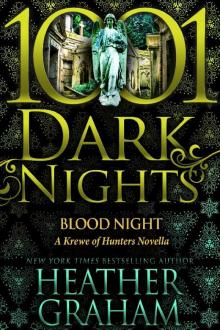 Blood Night
Blood Night Tangled Threat (Mills & Boon Heroes)
Tangled Threat (Mills & Boon Heroes) Darkest Journey
Darkest Journey Glory
Glory Deadly Touch
Deadly Touch An Unexpected Guest
An Unexpected Guest Night of the Vampires
Night of the Vampires Seize the Wind
Seize the Wind Ghost Moon
Ghost Moon The Vision
The Vision Dreaming Death
Dreaming Death Conspiracy to Murder
Conspiracy to Murder Horror-Ween (Krewe of Hunters)
Horror-Ween (Krewe of Hunters)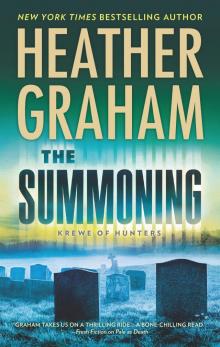 The Summoning
The Summoning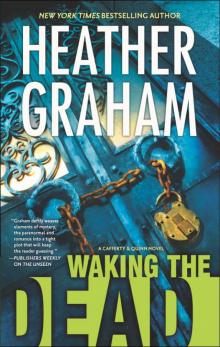 Waking the Dead
Waking the Dead Danger in Numbers
Danger in Numbers The Hidden
The Hidden Sweet Savage Eden
Sweet Savage Eden Tangled Threat ; Suspicious
Tangled Threat ; Suspicious Mother's Day, the Krewe, and a Really Big Dog
Mother's Day, the Krewe, and a Really Big Dog Picture Me Dead
Picture Me Dead The Killing Edge
The Killing Edge St. Patrick's Day
St. Patrick's Day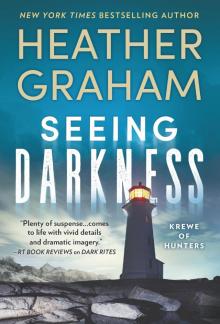 Seeing Darkness
Seeing Darkness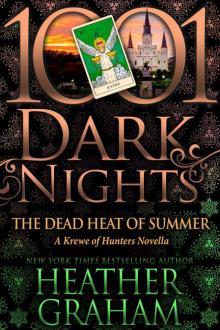 The Dead Heat of Summer: A Krewe of Hunters Novella
The Dead Heat of Summer: A Krewe of Hunters Novella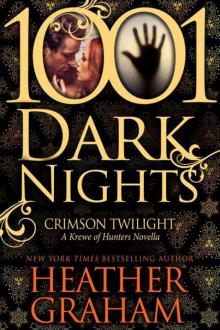 Crimson Twilight
Crimson Twilight Haunted Destiny
Haunted Destiny Devil's Mistress
Devil's Mistress Banshee
Banshee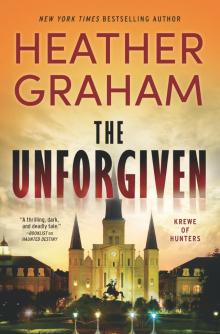 The Unforgiven
The Unforgiven The Final Deception
The Final Deception A Horribly Haunted Halloween
A Horribly Haunted Halloween Haunted Be the Holidays
Haunted Be the Holidays Deadly Gift
Deadly Gift Easter, the Krewe and Another Large White Rabbit
Easter, the Krewe and Another Large White Rabbit Haunted
Haunted The Silenced
The Silenced Let the Dead Sleep
Let the Dead Sleep Christmas, the Krewe, and Kenneth
Christmas, the Krewe, and Kenneth Big Easy Evil
Big Easy Evil Sinister Intentions & Confiscated Conception
Sinister Intentions & Confiscated Conception Haunted Be the Holidays: A Krewe of Hunters Novella
Haunted Be the Holidays: A Krewe of Hunters Novella Blood Red
Blood Red A Perilous Eden
A Perilous Eden Slow Burn
Slow Burn Strangers In Paradise
Strangers In Paradise Bitter Reckoning
Bitter Reckoning Krewe of Hunters, Volume 1: Phantom Evil ; Heart of Evil ; Sacred Evil ; The Evil Inside
Krewe of Hunters, Volume 1: Phantom Evil ; Heart of Evil ; Sacred Evil ; The Evil Inside Do You Fear What I Fear?
Do You Fear What I Fear? The Face in the Window
The Face in the Window Krewe of Hunters, Volume 3: The Night Is WatchingThe Night Is AliveThe Night Is Forever
Krewe of Hunters, Volume 3: The Night Is WatchingThe Night Is AliveThe Night Is Forever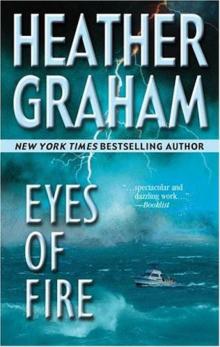 Eyes of Fire
Eyes of Fire Apache Summer sb-3
Apache Summer sb-3 Sensuous Angel
Sensuous Angel In the Dark
In the Dark Knight Triumphant
Knight Triumphant Hours to Cherish
Hours to Cherish Tender Deception
Tender Deception Keeper of the Dawn tkl-4
Keeper of the Dawn tkl-4 Apache Summer
Apache Summer Between Roc and a Hard Place
Between Roc and a Hard Place Echoes of Evil
Echoes of Evil The Game of Love
The Game of Love Sacred Evil (Krewe of Hunters)
Sacred Evil (Krewe of Hunters) Bougainvillea
Bougainvillea Tender Taming
Tender Taming Keeper of the Night (The Keepers: L.A.)
Keeper of the Night (The Keepers: L.A.) Lonesome Rider and Wilde Imaginings
Lonesome Rider and Wilde Imaginings Lucia in Love
Lucia in Love The Gatekeeper
The Gatekeeper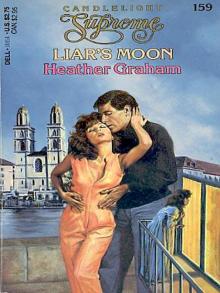 Liar's Moon
Liar's Moon Dark Rites--A Paranormal Romance Novel
Dark Rites--A Paranormal Romance Novel A Season for Love
A Season for Love Krewe of Hunters, Volume 6: Haunted Destiny ; Deadly Fate ; Darkest Journey
Krewe of Hunters, Volume 6: Haunted Destiny ; Deadly Fate ; Darkest Journey Keeper of the Dawn (The Keepers: L.A.)
Keeper of the Dawn (The Keepers: L.A.)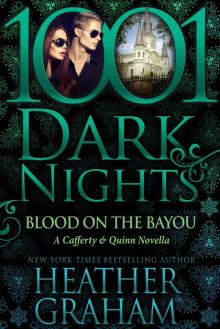 Blood on the Bayou: A Cafferty & Quinn Novella
Blood on the Bayou: A Cafferty & Quinn Novella Double Entendre
Double Entendre A Perfect Obsession--A Novel of Romantic Suspense
A Perfect Obsession--A Novel of Romantic Suspense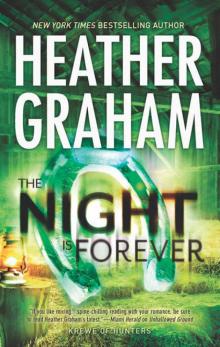 The Night Is Forever koh-11
The Night Is Forever koh-11 The Di Medici Bride
The Di Medici Bride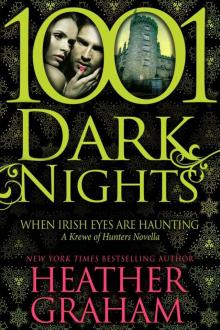 When Irish Eyes Are Haunting: A Krewe of Hunters Novella
When Irish Eyes Are Haunting: A Krewe of Hunters Novella The Keepers: Christmas in Salem: Do You Fear What I Fear?The Fright Before ChristmasUnholy NightStalking in a Winter Wonderland (Harlequin Nocturne)
The Keepers: Christmas in Salem: Do You Fear What I Fear?The Fright Before ChristmasUnholy NightStalking in a Winter Wonderland (Harlequin Nocturne)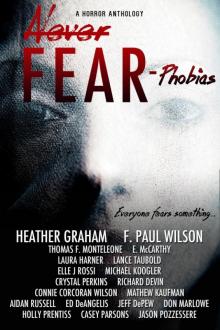 Never Fear
Never Fear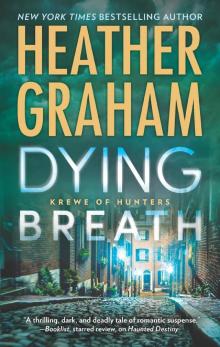 Dying Breath--A Heart-Stopping Novel of Paranormal Romantic Suspense
Dying Breath--A Heart-Stopping Novel of Paranormal Romantic Suspense If Looks Could Kill
If Looks Could Kill This Rough Magic
This Rough Magic Heather Graham's Christmas Treasures
Heather Graham's Christmas Treasures Hatfield and McCoy
Hatfield and McCoy The Trouble with Andrew
The Trouble with Andrew Never Fear - The Tarot: Do You Really Want To Know?
Never Fear - The Tarot: Do You Really Want To Know? Blue Heaven, Black Night
Blue Heaven, Black Night Forbidden Fire
Forbidden Fire Come the Morning
Come the Morning Dark Stranger sb-4
Dark Stranger sb-4 Lie Down in Roses
Lie Down in Roses Red Midnight
Red Midnight Krewe of Hunters Series, Volume 5
Krewe of Hunters Series, Volume 5 Night, Sea, And Stars
Night, Sea, And Stars Snowfire
Snowfire Quiet Walks the Tiger
Quiet Walks the Tiger Mistress of Magic
Mistress of Magic For All of Her Life
For All of Her Life Runaway
Runaway The Night Is Alive koh-10
The Night Is Alive koh-10 The Evil Inside (Krewe of Hunters)
The Evil Inside (Krewe of Hunters)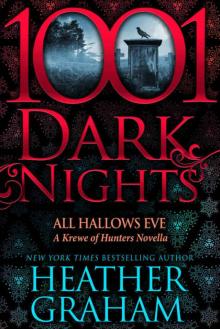 All Hallows Eve: A Krewe of Hunters Novella (1001 Dark Nights)
All Hallows Eve: A Krewe of Hunters Novella (1001 Dark Nights) Tomorrow the Glory
Tomorrow the Glory Ondine
Ondine Angel of Mercy & Standoff at Mustang Ridge
Angel of Mercy & Standoff at Mustang Ridge Bride of the Tiger
Bride of the Tiger When Next We Love
When Next We Love Heather Graham Krewe of Hunters Series, Volume 4
Heather Graham Krewe of Hunters Series, Volume 4 A Season of Miracles
A Season of Miracles Realm of Shadows (Vampire Alliance)
Realm of Shadows (Vampire Alliance) When We Touch
When We Touch Serena's Magic
Serena's Magic Rides a Hero sb-2
Rides a Hero sb-2 All in the Family
All in the Family Handful of Dreams
Handful of Dreams A Stranger in the Hamptons
A Stranger in the Hamptons Krewe of Hunters, Volume 2: The Unseen ; The Unholy ; The Unspoken ; The Uninvited
Krewe of Hunters, Volume 2: The Unseen ; The Unholy ; The Unspoken ; The Uninvited Never Sleep With Strangers
Never Sleep With Strangers Eden's Spell
Eden's Spell A Magical Christmas
A Magical Christmas Forever My Love
Forever My Love King of the Castle
King of the Castle Night Moves (60th Anniversary)
Night Moves (60th Anniversary) The Island
The Island Borrowed Angel
Borrowed Angel Hallow Be the Haunt: A Krewe of Hunters Novella
Hallow Be the Haunt: A Krewe of Hunters Novella Why I Love New Orleans
Why I Love New Orleans The Last Cavalier
The Last Cavalier A Matter of Circumstance
A Matter of Circumstance Heather Graham's Haunted Treasures
Heather Graham's Haunted Treasures Tempestuous Eden
Tempestuous Eden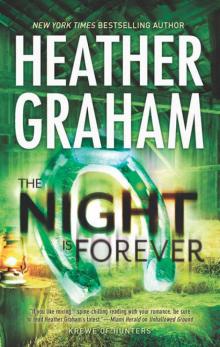 Krewe 11 - The Night Is Forever
Krewe 11 - The Night Is Forever